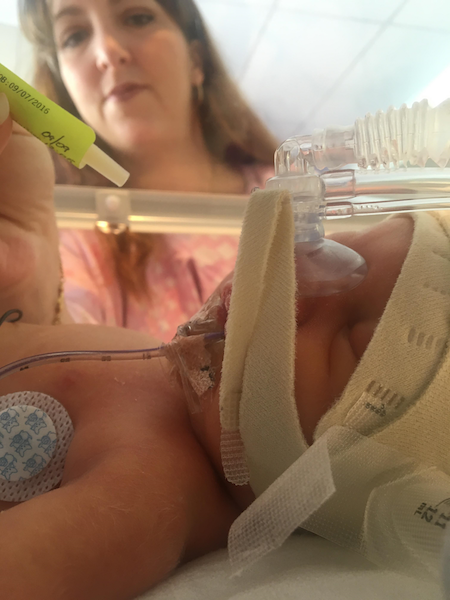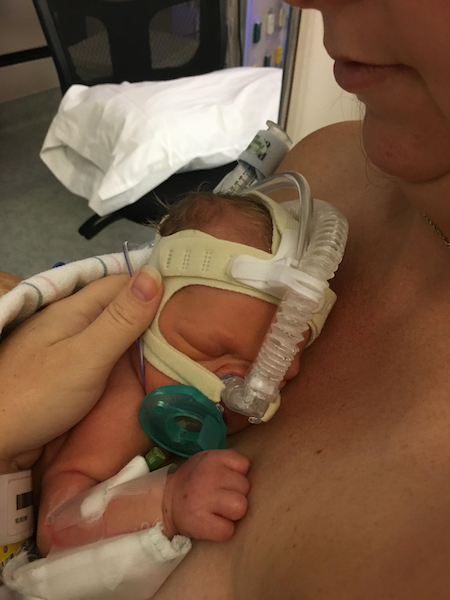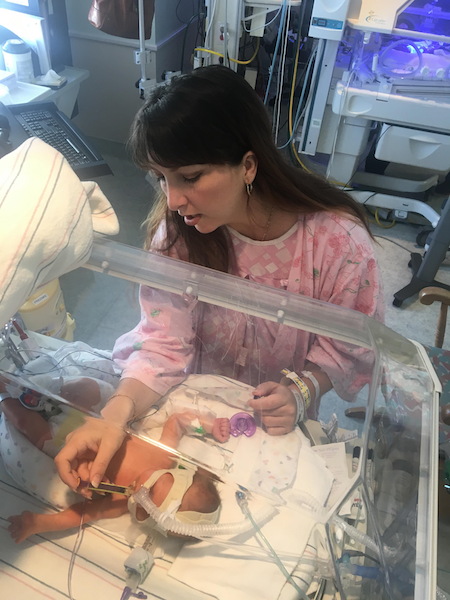Worth it all: The birth of Dustin

Who knew that me and Kim Kardashian would have something in common … Placenta Accreta. If I were her and was able to have another baby, I would take my doctor’s advice and find a surrogate to carry my baby.
What is Placenta Accreta, you ask? It is a condition where the placenta, while searching for blood supply, acts like cancer and eats through your uterus. In my case, the condition progressed to its most advance form, Placenta Percreta. It not only devoured my uterus, but it started invading other organs. I had to have my bladder repaired, my uterus removed and cervix removed, and I will never be able to have another baby of my own. I was very lucky to have found out about the condition early in my pregnancy. Those who aren’t aware of Placenta Accreta have a much higher mortality rate of 9 percent.
I went to a specialist at 20 weeks gestation to see how my baby’s heart was developing. My husband’s family has a history of heart abnormalities, and we wanted to make sure our baby’s heart was OK. The baby looked great, but our doctor found the Accreta and Previa. I already knew that I was going to have a C-section with this pregnancy, because my other two babies were born via cesarean, too. Thus, I wasn’t too scared about the Placenta Previa, but what was Placenta Accreta and why did our doctor look so concerned?
She explained the condition to us and told me that we would be delivering this baby at 34 weeks, if not sooner, to save my life. I was not happy to hear that this baby would be born so early. I even asked if we could wait until 36 weeks to let the baby develop more and have a better chance of survival, but our doctor insisted we perform the C-section to lessen the chance of hemorrhaging and needing blood transfusions. She explained that the longer we wait to remove the baby and placenta, the more likely the placenta will grow through the uteran wall (resulting in a hysterectomy) and invade other organs. After she explained the risks and reminded me that I had a family that needed me to survive this pregnancy, I agreed to the planned C-section at 34 weeks.
At 27 weeks gestation I started bleeding and was hospitalized for the remaining time. I probably bled because I was chasing my 3-year-old and 1-year-old around the playground instead of taking it easy like my doctor had advised. I was stuck in a hospital bed under constant supervision and monitoring for what seemed like an eternity. I would have lost my sanity in that hospital room if it weren’t for my husband, my other two children, friends and family visiting me every day. I also had my new online business to keep me busy.
When I found out I was pregnant this time around, I developed a new product called the Wiggle Worm Wrap. After creating this product, patenting it, and opening an online shop to sell it, I ended up in the hospital. With my husband’s and mother’s help, I was still able to sell and ship products even though I was confined to those four walls. When the eve of my delivery date finally arrived, it took everything in me not to cry when I said goodbye to my two children. It could have been the last time I saw their precious little faces. We worked so hard to have the family we created (both were IVF babies) and it seemed like I was going to loose everything we fought so hard for.
I hardly slept that night. I was so anxious and scared knowing that the worst could happen. My husband arrived early in the morning and was there for most of the surgery. I had a team of surgeons working on me and an oncologist was heading that team. The oncologist was called in to remove the placenta since it was acting like cancer and eating through my uterus. The surgery only took a couple of hours. I lost a lot of blood but I didn’t need a transfusion, and they kept me awake the entire time. I had an epidural to numb my body and didn’t feel anything.
It only took a few minutes for the team to get my baby boy out. I was relieved when I heard him cry. He stopped breathing a few times and they had to get him breathing and stabilized, but once he was stable, my husband went with him and the doctors to the NICU. Everything was going as planned. My husband returned from the NICU to let me know that our son was doing well considering that he was born six weeks early. I was then informed that they would be removing my uterus. I was expecting that they would be removing it, and as long as my baby was OK (and I was going to survive this surgery), I was OK with that.
After that ordeal was over, we had much more to overcome. I needed to recover quickly so that we could juggle our newborn in the NICU and two little ones at home. My recovery was rather quick. Except for the pain, the only bother was the catheter that I had to wear for 10 days following the surgery. The catheter was required because they had to repair my bladder. Once that was out, I felt fine (just very sore) and was able to run back and forth to the hospital every day to try and nurse my son, pump every three hours, and get back to my other children at home.
It took a huge effort on my part to get my breast milk to come in, but eventually it did, and he was able to nurse after about one week. The milk that I was able to pump I would leave at the NICU, and the staff would feed it to him when I wasn’t there. My newborn was only in the NICU for three weeks. It was difficult to see him on a ventilator and with a feeding tube, but I knew he was getting the best care. Once my new son was off of the ventilator, eating without the feeding tube and gaining weight, we were able to take him home. Once home all together for the first time, I was able to breathe a sigh of relief. I felt so fortunate to have my beautiful, healthy and happy family all under the same roof.
I hope my story helps some women in the same or a similar situation. It would be great if more light was shed on the subject by discussing Accrete and discussing it with women planning to have other children. It isn’t a very well known or commonly discussed condition, but the condition itself is becoming more common, and more women are being diagnosed. Getting the diagnoses, knowing what your about to face and being prepared is half the battle. Typically, it is when women don’t know that they have Accreta that the condition may be fatal. So, my advice after everything is to get the medical care you need when pregnant.
Send us your birth story! Whether you had a home birth, hospital birth, 37-hour labor or emergency C-section, we’d love to read the tale of your little one’s grand entrance. Write up your birth story (click here for tips on getting started) and email it, along with a few photos, to birthstory@pnmag.com. We’ll share it on our Birth Day blog and may even print it in an upcoming issue!









